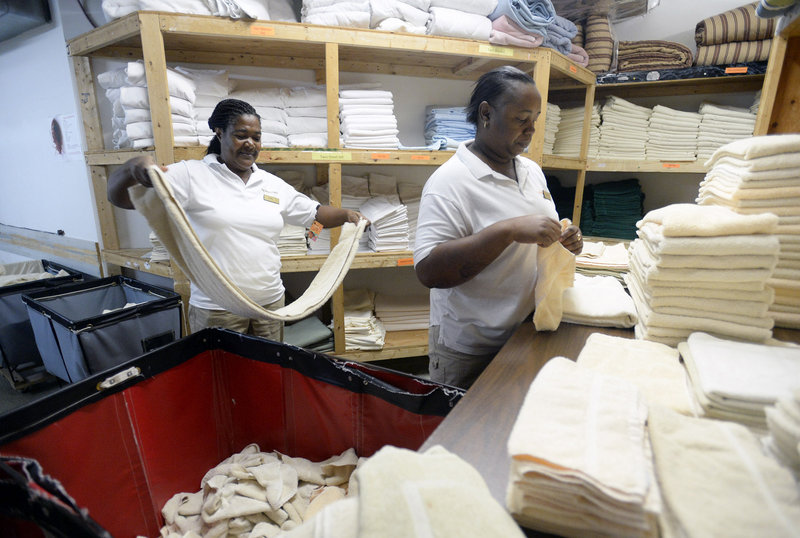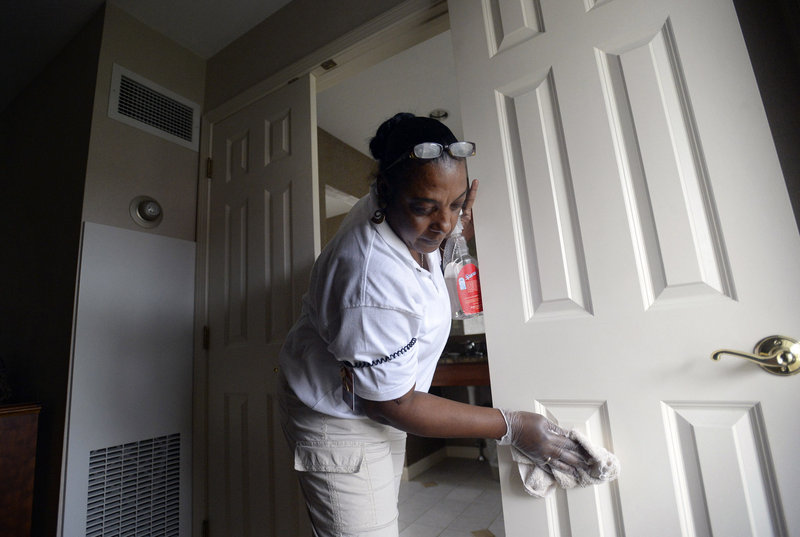OGUNQUIT – Every tourist season for the past decade, the owners of The Beachmere Inn have relied on a handful of foreign workers to change linens, vacuum carpets and tidy up the 73 rooms in the waterfront hotel.
Sarah Diment said she tries each year to fill the spots with American workers, occasionally recruiting hours away in Bangor or even farther north. But because of the seasonal nature of the jobs and competition for workers in a town with twice as many hotel rooms as full-time residents, Diment inevitably looks abroad to fill three or four spots in her 17-person housekeeping crew.
This year, The Beachmere Inn is going into the summer shorthanded because federal agencies have temporarily stopped processing for H-2B temporary guest workers.
“It’s hard when we don’t have enough people,” said Grace Jerauld, who has worked The Beachmere’s front desk for 15 years. “It’s hard on the housekeeping department, so they’re working six days instead of five and they’re stretched thin, doing the job of one and a half people — a physically demanding job.”
As Congress considers sweeping changes to the nation’s immigration laws, Diment and others in the hospitality industry are urging members of Congress to provide more certainty to businesses that use the guest worker visa program.
“H-2B workers are essential to our operation and they are seen by our employees as critical backup they need during the summer and fall months,” Diment told members of a congressional subcommittee Wednesday.
The program is tightly regulated — although not as tightly as some would like. Businesses must actively seek American workers first, pay substantial fees or travel costs to bring in foreign workers, and pay those workers a “prevailing wage” based on the regional average for that job.
Would-be workers, meanwhile, must be interviewed at a U.S. embassy or consulate.
Debate on Capitol Hill over guest workers has been muted compared to the controversy over creating a “pathway to citizenship” for an estimated 11 million illegal immigrants. But industries that hire temporary foreign workers to harvest crops, clean hotel rooms or do other tough-to-fill jobs are stepping up their lobbying in hopes of expanding or streamlining the programs.
The H-2B program has its critics at a time when millions of American workers are still unemployed and the country continues to dig out of the recession.
William Spriggs, chief economist for the AFL-CIO, called Diment and the other business representatives present on Wednesday “model employers.” But he said the federal government needs clearer, more stringently enforced rules to prevent dishonest employers from hiring foreign workers for entry-level jobs that could be filled by unemployed Americans.
“We know there are many violations of the program where the program has been abused,” Spriggs said. “And the regulations need to reflect those who misuse the program.”
About 60 employers in Maine, ranging from hotels to wreath-making companies, notified the Maine Department of Labor that they plan to seek 1,085 H-2B visas for temporary foreign workers in 2013.
While the department is required to verify that those jobs are duly advertised for U.S. workers, the state isn’t told by the federal government how many of those visas are ultimately used.
Requests for hospitality-related H-2B visas are most common in coastal towns such as Old Orchard Beach, Ogunquit, Boothbay, Camden and Bar Harbor.
Merlene Warren, a resident of Montego Bay, Jamaica, landed a visa to work in Ogunquit. She is one of The Meadowmere Resort’s 12 to 14 seasonal employees from Jamaica, cleaning rooms during the summer.
Warren said she does the work “to care for my family back home, for my children.”
“It is a sort of sacrifice for them,” said Warren, a mother and grandmother who is working her eighth summer at the resort.
Allyson Cavaretta, the resort’s director of sales and marketing, said all of its seasonal employees come from Jamaica because the resort has a good relationship with an employment agency there.
Many return year after year to do housekeeping and cook in the resort’s pub.
Cavaretta said the resort has had only about five applications from U.S. citizens in the last eight or nine years.
In her testimony to the House Small Business subcommittee, Diment said The Beachmere Inn got 16 responses to its housekeeping ads for this year. Nine respondents didn’t show up for interviews. Among the seven who did, two failed reference checks, two showed “obvious lack of interest” and two declined job offers.
“People think that they’re taking American jobs, but nothing could be further than the truth,” said Cavaretta.
“It’s not like (we are) going to the border and filling a truck. It’s a very old program and heavily monitored.”
The Meadowmere’s workers hit more snags than usual coming into the country after federal agencies suspended the H-2B application processing because of a court ruling in March.
“We’ve been having to provide extra things for them to travel, like past pay stubs, even though they’ve been working here for several years, or letters from management,” Cavaretta said. “Plus more interrogation time at immigration. It’s usually one to three hours, but one girl was there for 12.”
Kevin Miller can be contacted at 317-6256 or at:
kmiller@mainetoday.com
On Twitter: @KevinMillerDC
Send questions/comments to the editors.




Success. Please wait for the page to reload. If the page does not reload within 5 seconds, please refresh the page.
Enter your email and password to access comments.
Hi, to comment on stories you must . This profile is in addition to your subscription and website login.
Already have a commenting profile? .
Invalid username/password.
Please check your email to confirm and complete your registration.
Only subscribers are eligible to post comments. Please subscribe or login first for digital access. Here’s why.
Use the form below to reset your password. When you've submitted your account email, we will send an email with a reset code.